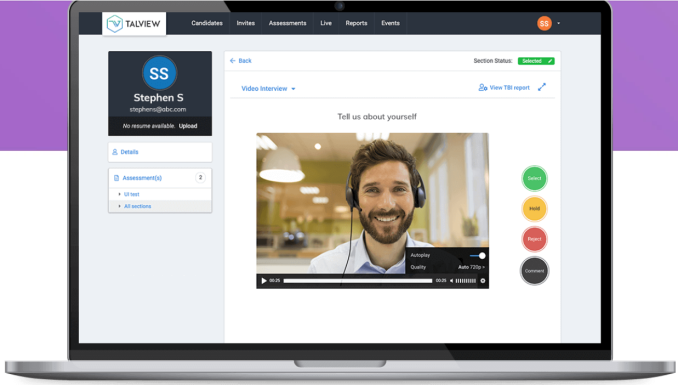If you’re looking to qualify more candidates faster, you should start using a video interview solution. HR managers and recruiters are increasingly using these platforms to streamline and expedite their hiring processes as we can see in the data:
- Before COVID-19, a study revealed that video technology was being used by at least 60% of hiring managers and recruiters. Fast forward to this year, a poll of HR leaders found that as many as 86% of organizations are now using virtual technology to interview candidates.
- Not only do hiring managers like video interviewing, but as many as 57- 59% of candidates do too. Moreover, 98% of candidates interviewed via video tend to perceive the employer as innovative – a reputation you’ll want to have.
While the benefits of pre-recorded video interviewing are many, choosing software solutions that facilitate it can be a tricky process. Our goal with this guide is to save you time, provide you with a shortlist of the best video interview tools, and provide all the other advice you need to make the right purchasing decision. With this guide, you’ll be able to figure out the ROI from video interview software, avoid the common pitfalls of using these solutions, and get in contact with the best vendors in the space.
- Ducknowl
Ducknowl is a platform for pre-recorded video interviews that streamlines and expedites the employment process. Recruiters and HR departments devote a significant amount of effort to prospect screening. However, the best prospects do not always come up. It solves your screening-related problem. It includes video interviewing, talent appraisal, video job descriptions, resume screening, audio screening, and video texting as tools to help you save time and make better hiring decisions. The per-position customization of the solution will allow it to match the individual needs of any hiring scenario.
- MyInterview
myInterview’s video interview software can be dropped into your existing career site through an easy-to-implement widget, which means you can be using video interviews in under an hour. Their customers include Facebook, Australia’s Hudson recruitment, and British household names P&O Ferries and Ocado.
It’s worth checking out their latest module, which uses machine learning to assess candidate answers based on their professionalism, reasoning, etc. MyInterview takes a “glass box” (vs. black box) approach to leveraging AI for their hiring analytics.
- Brazen
While Brazen is a virtual career fair platform (one of the best ones) they also have a video interview tool. You can use it to have high-quality video conversations in real-time and as a part of broader user flows within their recruitment solution. It’s easy to switch between text and video, even with multiple candidates at once. Scheduled video chats will also be available shortly. Notably, Brazen also offers an HR chatbot that can handle a good percentage of the interactions with each candidate.
- OutMatch
OutMatch Video allows recruiting teams to run both on-demand and live video interviews with job seekers and has available integrations with widely used ATSs like iCIMS, Taleo, and Greenhouse. Their technology can be rapidly implemented, has recruitment branding features, and enables structured, collaborative interviewing across an organization. OutMatch’s live interviewing technology can even support group or panel interviewing. Their customers include 7-Eleven, Panera, and Subway.
- XOR’s
XOR’s candidate communication platform now offers video interview functionality that seamlessly integrates with the rest of its platform. Recruiters can connect directly for live video interviews either on mobile or desktop. Talent acquisition teams can also have candidates record on-demand video interviews through their chatbot. In addition to video responses, the bot can also ask questions with multiple-choice or open-ended responses. XOR’s video interview solution is available as a stand-alone module or as part of their broader recruitment automation suite.
Final Thoughts
Pre-recorded video interviewing can be an exciting part of your recruiting process. This is especially true for high-volume roles where you’re spending a tremendous amount of time doing phone screens. While on-demand interviewing can drive ROI from decreased time spent on phone screens, it can also increase your hiring outcomes by allowing you to better understand who a candidate is before deciding whether or not to hire them.















